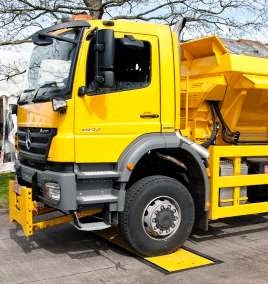Avery Weigh-Tronix (UK) - During the fourth quarter of 2014, the Driver and Vehicle Standards Agency (DVSA) and Vehicle and Operator Services Agency (VOSA) published their annual effectiveness report for 2013/14. The report highlighted that overloading continues to be a serious issue on the UK’s roads. Weighing expert Avery Weigh-Tronix warns both drivers and operators to be aware of the risks.
Colin Smith from Avery Weigh-Tronix commented, “As well as being a criminal offence which can attract fines and prosecution, overloading can have a detrimental impact on the roadworthiness of vehicles – from braking systems to increased instability and wear and tear.
“Looking through the report, it is worrying to note that roadside checks found defects in braking systems of almost 19% of HGV trailers, along with various other issues such as steering, suspension and tyres. An overloaded vehicle in good condition is potentially hazardous, but overloading a vehicle which also has other issues relating to its roadworthiness could be extremely dangerous.”
Overloading an issue for LGVs and HGVs:
The report, which contains data on vehicle testing and enforcement activity over the last twelve months, shows that overloading of LGVs is still the top offence on UK roads, with both the number of prosecutions and the average fine up on last year. Overloading of HGVs also continues to be an issue, being the fifth most common offence for prosecution during the same period.
Take measures to avoid overloading:
Colin continued, “I hope that these figures serve as a warning to fleet operators that overloading is a serious issue. Both the driver of the vehicle and the operator are legally responsible for avoiding overloading and both can be prosecuted. It is vital that both parties know and understand the risks and take measures to avoid overloading”.
“Drivers should check their vehicle’s ID plate, which is usually located in the cabin and gives details of maximum permissible axle weight and maximum permissible gross weight. Loads should also be evenly distributed across the vehicle and weights should be checked (using axle weighers or weighbridges) before setting out. Finally, drivers and operators should familiarise themselves with the legislation to ensure they know and understand their obligations.”
For more information and advice on avoiding the dangers of overloading click here.
Source Link
Other Articles from Avery Weigh-Tronix (UK)
© Avery Weigh-Tronix (UK) / International Weighing Review
This website uses cookies. By browsing our website you accept the use of cookies. For more information read our Terms of Use.
Overloading Confirmed as Top Offence on UK's Roads
- By Avery Weigh-Tronix
- Posted on Jan 13, 2015

For more information about this article from Avery Weigh-Tronix click here.
Other articles from Avery Weigh-Tronix.
Interesting Links:
List all your Scales and other Weighing Products (new and used) on our Marketplace !
Visit AutomationInside.com for Automation and Technology Related News!
Are you interested to include your Link here, visible on all WeighingReview.com articles and marketplace product pages? Contact us
List all your Scales and other Weighing Products (new and used) on our Marketplace !
Visit AutomationInside.com for Automation and Technology Related News!
Are you interested to include your Link here, visible on all WeighingReview.com articles and marketplace product pages? Contact us
© Avery Weigh-Tronix / International Weighing Review
Previous article
New feature on Weighing Review - Used Equipment
Next article
New Scale Management System from BACSA
Popular News
Weighing Review Newsletter
Popular Tags
Login





















Interested? Submit your enquiry using the form below:
Only available for registered users. Sign In to your account or register here.